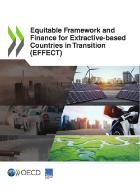Policy Dialogue on Natural Resource-based Development (PD-NR)
Low-carbon, just transition
The OECD Development Centre is assisting fossil-based and mineral-rich developing and emerging economies transition to a low-carbon future. This work offers realistic transition pathways to manage uncertainties, build resilience to external shocks, and make unprecedented structural changes, including by planning for the risks and opportunities of global decarbonisation.
Co-chairs: The European Commission and Nigeria
 Equitable Framework and Finance for Extractive-based Countries in Transition (EFFECT)
Equitable Framework and Finance for Extractive-based Countries in Transition (EFFECT)
How can fossil fuel producers and mineral-rich developing countries design realistic, just and cost-effective low-carbon transition pathways? Taking into account the heterogeneity of low-carbon trajectories, the Equitable Framework and Finance for Extractive-based Countries in Transition (EFFECT) provides options for policy makers, industry and finance institutions in search of the answers. The report aims to help them seize the transformational opportunities linked to sustainable, low-carbon growth. It identifies ways of mitigating the transition’s impacts on fossil fuel industries, workers and poor households, and of preventing the risks of high-carbon lock-in and stranded assets. Recognising the shared responsibility of consuming and producing countries in reducing fossil fuel production and use, EFFECT advocates for transformative partnerships for technology transfer, green finance and capacity building. Ultimately, it supports an equitable sharing of the transition’s benefits and costs, both across and within countries.
|
Click to read
|
Watch the launch event: |
Next Steps
After its high-level launch at COP27, hosted by the Canadian Pavilion in Sharm El-Sheikh, Egypt on 15 November 2022, EFFECT will support policy dialogues and peer learning on the cross-border and equity dimensions of the low-carbon transition, the development of tailored low-carbon transition roadmaps in developing and emerging producers as well as the shaping of transformative and just transition partnerships.
Find out more about EFFECT, its governance structure and expected outcomes.
Back to the Policy Dialogue on Natural Resource-based Development (PD-NR) homepage
Related Documents